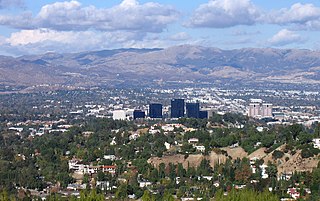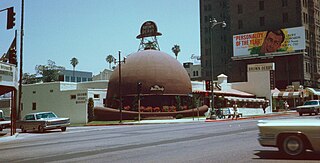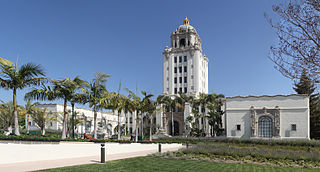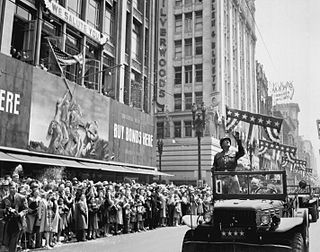
Woodland Hills is a neighborhood bordering the Santa Monica Mountains in the San Fernando Valley region of Los Angeles, California, United States.

Westwood is a commercial and residential neighborhood in the northern central portion of the Westside region of Los Angeles, California. It is the home of the University of California, Los Angeles (UCLA). Bordering the campus on the south is Westwood Village, a major regional district for shopping, dining, movie theaters, and other entertainment.
The Los Angeles Westside is an urban region in western Los Angeles County, California, United States. It has no official definition, but sources like LA Weekly and the Mapping L.A. survey of the Los Angeles Times place the region on the western side of the Los Angeles Basin south of the Santa Monica Mountains.

Brown Derby was a chain of restaurants in Los Angeles, California. The first and best known was shaped like a derby hat, an iconic image that became synonymous with the Golden Age of Hollywood. It was opened by Wilson Mizner in 1926. The chain was started by Robert H. Cobb and Herbert K. Somborn in the 1920s. The original Brown Derby restaurants had closed or had been converted to other uses by the 1980s, though a Disney-backed Brown Derby national franchising program revived the brand in the 21st century. It is often incorrectly thought that the Brown Derby was a single restaurant, and the Wilshire Boulevard and Hollywood branches are frequently confused.

Miracle Mile is a neighborhood in the city of Los Angeles, California.

Baldwin Hills is a neighborhood within the South Los Angeles region of Los Angeles, California.

Rodeo Drive is a two-mile-long (3.2 km) street in Beverly Hills, California, with its southern segment in the City of Los Angeles, known as one of the most expensive streets in the world. Its southern terminus is at Beverwil Drive, and its northern terminus is at its intersection with Sunset Boulevard in Beverly Hills. The name is most commonly used metonymically to refer to the three-block stretch of the street between Wilshire Boulevard and Little Santa Monica Boulevard.

La Cienega Boulevard is a major north–south arterial road in the Los Angeles metropolitan area that runs from El Segundo Boulevard in Hawthorne to the Sunset Strip in West Hollywood to the north. It was named for Rancho Las Cienegas, literally "The Ranch Of The Swamps," an area of marshland south of Rancho La Brea.

Wilshire Boulevard (['wɪɫ.ʃɚ]) is a prominent 15.83 mi (25.48 km) boulevard in the Los Angeles area of Southern California, extending from Ocean Avenue in the city of Santa Monica east to Grand Avenue in the Financial District of downtown Los Angeles. One of the principal east–west arterial roads of Los Angeles, it is also one of the major city streets through the city of Beverly Hills. Wilshire Boulevard runs roughly parallel to Santa Monica Boulevard from Santa Monica to the west boundary of Beverly Hills. From the east boundary, it runs a block south of Sixth Street to its terminus.

The Friars Club is a private club in New York City. Famous for its risqué roasts, the club's membership is composed mostly of people who work in show business. Founded in 1904, it is located at 57 East 55th Street, between Park Avenue and Madison Avenue, in the historic Martin Erdmann House, now known as the Monastery.
Hillcrest Country Club is a private country club located on the west side of Los Angeles, California. Founded in 1920, it is a historically Jewish country club and was established at a time when Jewish members were excluded from other elite social clubs in the city.
Sidney Eisenshtat was an American architect who was best known for his synagogues and Jewish academic buildings.

Morgan, Walls & Clements was an architectural firm based in Los Angeles, California and responsible for many of the city's landmarks, dating back to the late 19th century. Originally Morgan and Walls, with principals Octavius Morgan and John A. Walls, the firm worked in the area from before the turn of the century.
The Kronish House is a 7,000 square foot villa designed by Richard Neutra in 1955. The house is located on 9439 Sunset Boulevard in Beverly Hills, California in the United States. The house was designed for Herbert and Hazel Kronish.

The Beverly Hills City Hall is a historic building and city hall in Beverly Hills, California, United States.

Temple Emanuel is a Reform Jewish congregation and synagogue, located at 300 North Clark Drive, in Beverly Hills, California, in the United States.

Richard Dorman was a mid-century modern architect known for his residential and commercial work in Southern California.

Mulholland Estates is a guard gated community in the Santa Monica Mountains of Southern California, US. It is named after pioneering Los Angeles civil engineer William Mulholland. Although properties in the estate have a 90210 ZIP code and thus a Beverly Hills address, it is actually part of the Beverly Hills Post Office area in the city of Los Angeles, with much of the land located inside the Sherman Oaks district. The community's main entrance is located at Beverly Glen Boulevard and Mulholland Drive, next to Fossil Ridge Park, and it looks out to the San Fernando Valley.

Mullen & Bluett was a Los Angeles-based department store specializing in men's clothing.

















